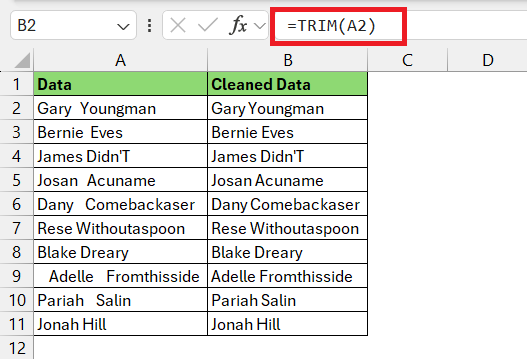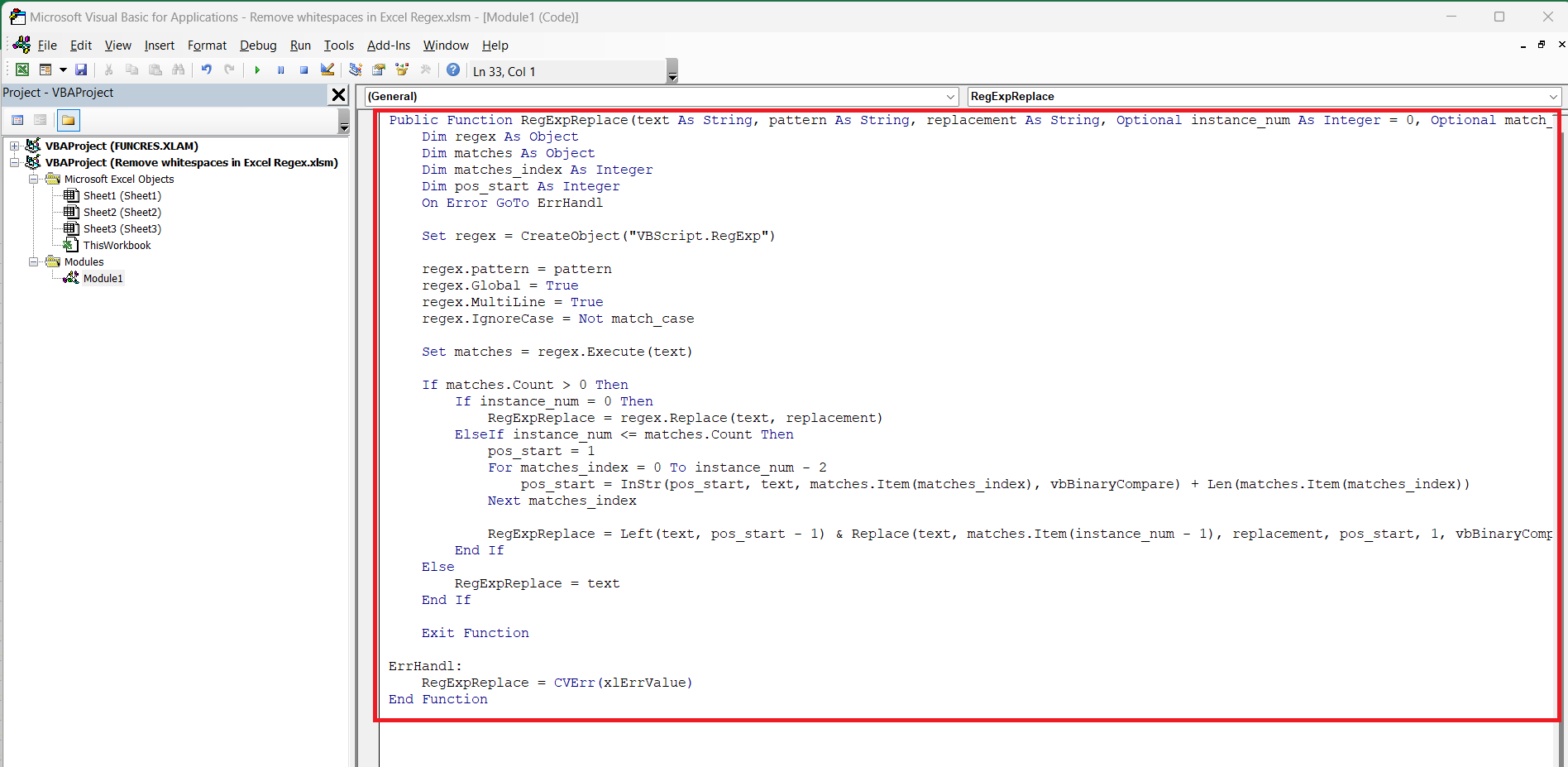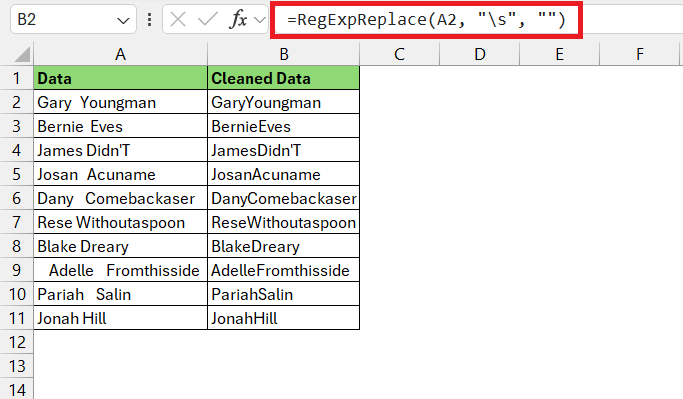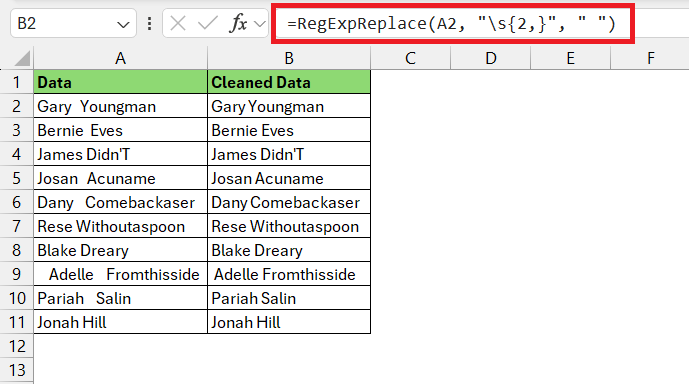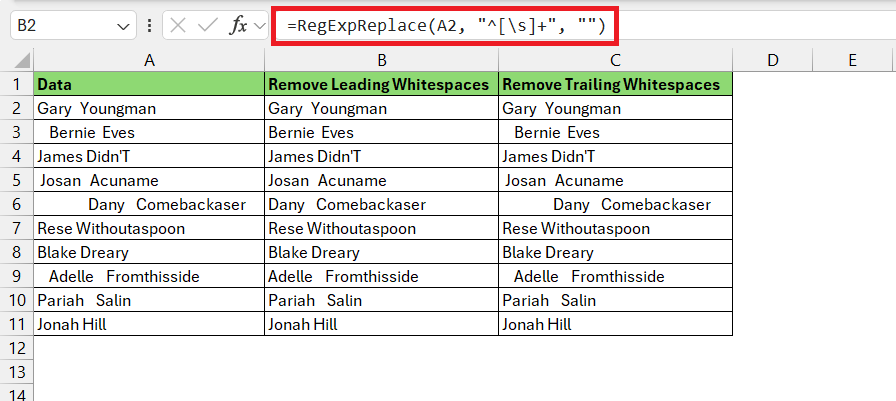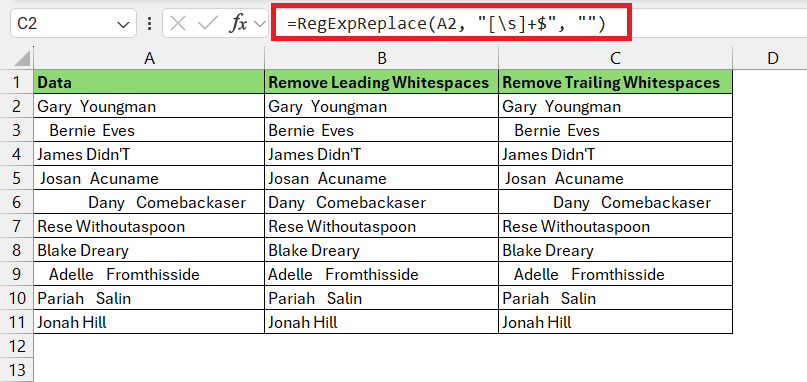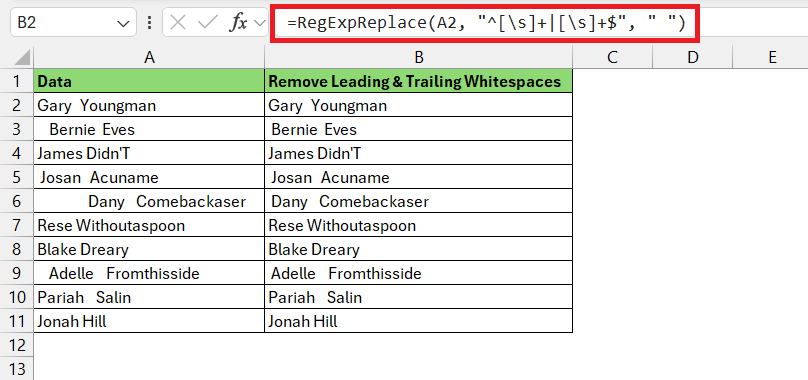Unlock the potential of regex in Microsoft Excel, revolutionizing your data handling experience. Dive into the synergy of two seemingly disparate worlds—Excel’s data prowess and regex’s text manipulation finesse. With a bit of wizardry, you’ll transform your spreadsheet into a powerhouse of clean, structured data.
Key Takeaways:
- Regex Revelations: Regex empowers you to set precise patterns for text manipulation, enabling targeted data extraction and cleansing.
- Excel-Regex Fusion: Merge the analytical might of Excel with regex’s text-manipulating finesse, creating a dynamic duo for data analysis and processing.
- Whitespace Wizardry: Harness regex spells to trim leading and trailing spaces, ensuring your data shines with professionalism and clarity.
- Custom Formula Crafting: Tailor regex formulas to remove whitespace, adapting to different types of spaces with ease and precision.
Table of Contents
Unveiling the Magic of Regex in Excel
The Basics of Regular Expressions
Regular expressions, or regex for short, are an incredibly powerful tool for textual data manipulation. They work as a framework that lets you set patterns for text searching and matching. Think of regex as a search party with highly specialized instructions to pick out specific data sequences from a bigger picture. Using regex, you’re able to pinpoint everything from simple characters like a space to complex patterns in your Excel data.
Excel and Regex: An Unlikely Duo
Excel, your reliable companion for all things data, is not immediately known for its text-processing capabilities. However, with recent enhancements and third-party add-ons, it’s now possible to marry the analytic prowess of Excel with the text-manipulating strength of regex. This partnership may seem unlikely, but it’s a match made in heaven for data analysts and spreadsheet lovers.
Cleansing Your Data with a Wave of Regex Wand
Tricks for Trimming Leading and Trailing Spaces
Want to give your data a quick touch-up? Slicing off uninvited leading and trailing spaces can make your spreadsheet look professionally groomed. The trick here isn’t really pulling a rabbit out of a hat, but more of a simple sleight of hand.
With regex, you can craft a pattern that specifically targets these spaces. If regex sounds daunting, worry not; you can also use the Excel TRIM function which doesn’t require regex knowledge. Just enter =TRIM(A2), and Excel will smartly cut those spaces out as if by magic.
Voila! Your data has just been polished!
Step-by-Step Guide to White Space Removal
Getting Started: Enabling Regex in Excel
Taking the leap into integrating regex in Excel requires an initial setup since it’s not supported out of the box. To get started, you’ll need to create a custom function, such as RegExpReplace, which allows you to leverage regex capabilities within your spreadsheets.
To do this, copy the VBA code written below and paste it into the VBA editor within Excel.
Public Function RegExpReplace(text As String, pattern As String, replacement As String, Optional instance_num As Integer = 0, Optional match_case As Boolean = True) As String Dim regex As Object Dim matches As Object Dim matches_index As Integer Dim pos_start As Integer On Error GoTo ErrHandl Set regex = CreateObject("VBScript.RegExp") regex.pattern = pattern regex.Global = True regex.MultiLine = True regex.IgnoreCase = Not match_case Set matches = regex.Execute(text) If matches.Count > 0 Then If instance_num = 0 Then RegExpReplace = regex.Replace(text, replacement) ElseIf instance_num <= matches.Count Then pos_start = 1 For matches_index = 0 To instance_num - 2 pos_start = InStr(pos_start, text, matches.Item(matches_index), vbBinaryCompare) + Len(matches.Item(matches_index)) Next matches_index RegExpReplace = Left(text, pos_start - 1) & Replace(text, matches.Item(instance_num - 1), replacement, pos_start, 1, vbBinaryCompare) End If Else RegExpReplace = text End If Exit Function ErrHandl: RegExpReplace = CVErr(xlErrValue) End Function
Save your file as a macro-enabled workbook, and you’ve unlocked a secret chamber of Excel magic. Now, you’re ready to weave regex spells into your data analysis wizardry.
Flawless Regex Recipes for Pristine Spreadsheets
For a pristine spreadsheet, free of unwanted whitespaces, your regex cookbook should include a few staple recipes. Using a regex add-on, you’ll find that trimming spaces from a dataset becomes an effortless task. For example, to zap all spaces in a cell use =RegExpReplace(A2, "\s", "").
To merge multiple spaces into one, you’ll mix in =RegExpReplace(A2, "\s{2,}", "").
These recipes ensure your data is not only clean but also served up with consistency.
Specific Regex Spells for Excel Wizards
Conjuring Patterns to Target Whitespace
When you’re ready to specifically target all forms of whitespace—those invisible characters that inhabit the margins of your text—conjuring the right regex pattern is key. For leading whitespace, the pattern ^[\s]+ will do the trick,
and for trailing whitespace, try [\s]+$.
Sometimes you’ll need to address both at the same time, and in that case, the bifurcated pattern ^[\s]+|[\s]+$ comes to your rescue.
Use these patterns with a replacement parameter set to an empty string, “”, and you will banish those unwanted space-dwellers from the realms of your cells.
Real-world Sorcery: Applying Regex in Excel Functions
Seamless Merging of Regex with Worksheet Functions
Combining regular expressions with Excel’s worksheet functions can create a seamless blend of data manipulation sorcery. Imagine linking regex with functions like FIND, SEARCH, or even IF to conditionally cleanse or reformat string data based on specific patterns you define.
This fusion allows you to sift through text with a fine-tooth comb, isolating and transforming data points with ease. By mastering this technique, you become an Excel wizard, conjuring up clean text data as if by magic.
Customizing Your Formula for Different Varieties of Whitespace
When dealing with different types of whitespace, a custom formula is your best friend. Whether you’re up against single spaces, tabs, new lines, or a mix, regex lets you tailor your approach. Create a pattern that targets multiple types of whitespace with a regex class like \s, which encompasses them all.
Then, adjust your formula to replace or remove these space characters as required. Flexibility is key—by customizing your formulas, you can adapt to any whitespace situation with precision.
FAQs on Removing whitespace with Excel Regex
How to remove white space in regex?
To remove white space in regex, use the pattern \s+ to match any whitespace characters and replace them with an empty string. In Excel, you might use a formula such as =SUBSTITUTE(A1, "\s+", "") if you are utilizing an add-on that incorporates regex functionality. This will eliminate all spaces, tabs, and invisible characters like new lines from the cell content.
Can I use regex in all versions of Excel?
Regex is not natively supported in all versions of Excel. However, you can use regex in Excel by enabling macros and creating custom functions using Visual Basic for Applications (VBA) or by using third-party add-ons that provide regex functionality, compatible with the most recent versions of Excel. Make sure to check the compatibility of your Excel version with the add-on or the VBA feature beforehand.
What is the formula to remove all spaces in Excel using regex?
The formula to remove all spaces using regex in Excel would be a customized function, such as =RegExpReplace(A1, "\s+", ""), which finds and replaces all types of whitespace characters with an empty string. This will condense the text by eliminating all spaces within the cell’s string. Ensure you’ve installed a regex-supporting add-on or implemented a VBA function for this formula to work.
Is there a non-formula way to use regex for removing whitespace in Excel?
Yes, there is a non-formula way to use regex for removing whitespace in Excel. This involves using a regex tool from an add-on, like Ultimate Suite, which allows you to apply regex operations directly on your data without formulas. Simply select your data, open the tool, enter your regex pattern, choose the “Remove” option, and let the add-on perform the cleanup. It’s an excellent alternative, especially if you’re not keen on working with formulas.
How do I remove text from regex in Excel?
To remove text using regex in Excel, combine a pattern that matches your text criteria with a regex-enabled function, typically replacing the text with an empty string. For instance, if you want to remove all numeric characters, you’d use =RegExpReplace(A1, "\d+", ""). This regex pattern, \d+, matches one or more digits and the RegExpReplace function replaces them with nothing, effectively removing them from your cell’s content.
John Michaloudis is a former accountant and finance analyst at General Electric, a Microsoft MVP since 2020, an Amazon #1 bestselling author of 4 Microsoft Excel books and teacher of Microsoft Excel & Office over at his flagship MyExcelOnline Academy Online Course.

